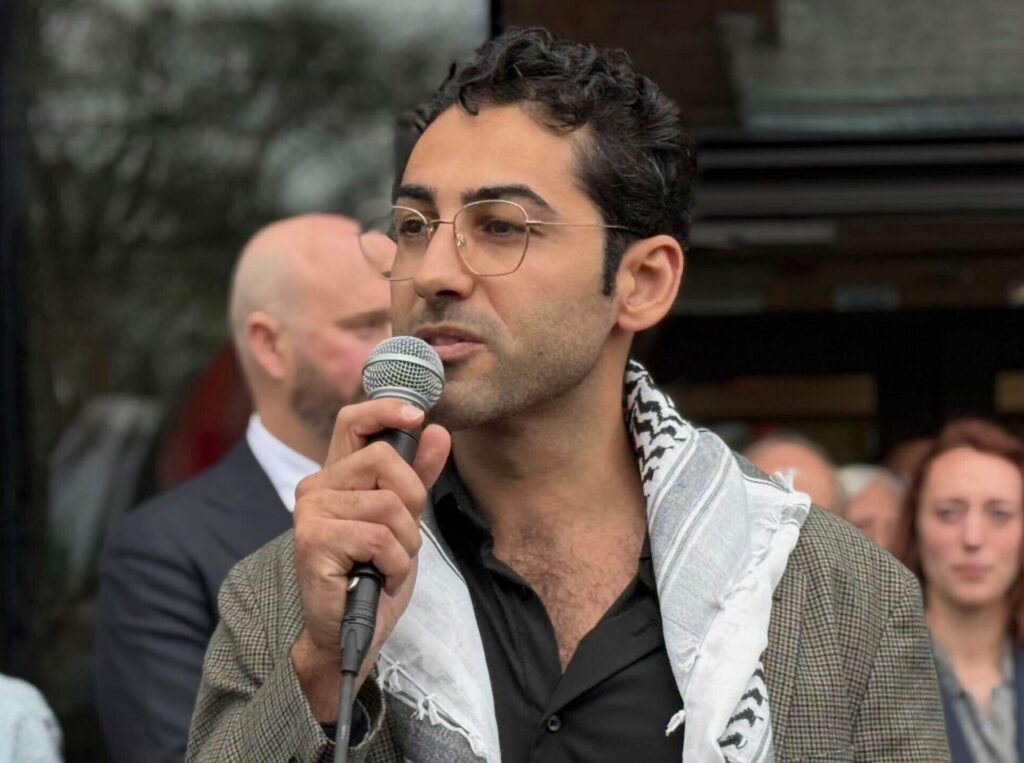A judge in the United States has ordered the release of Mohsen Mahdawi, a Columbia University student and pro-Palestine activist, as his case against deportation continues.
On Wednesday in Burlington, Vermont, US District Judge Geoffrey Crawford decided that Mahdawi could leave the Northwest State Correctional Facility, where he was detained after immigration officials apprehended him earlier this month.
Mahdawi left the courthouse with his arms raised, showing peace signs as supporters greeted him with applause.
During his remarks, he conveyed a message to President Donald Trump, whose administration has taken action against student demonstrators opposing Israel’s actions in Gaza.
“I am not afraid of you,” Mahdawi stated to Trump. He also reached out to the people of Palestine and wanted to clarify that the student protests were solely peaceful.
“We advocate for peace and oppose war,” Mahdawi articulated. “To my brothers and sisters in Palestine: I feel your pain, I witness your struggles, and I foresee freedom coming very soon.”
Mahdawi, a lawful US resident, had played a significant role in protests at Columbia University and was detained on April 14 while attending a citizenship interview. A video of his arrest spread quickly across social media.
This incident is part of a broader initiative by the Trump administration targeting visa holders and permanent residents involved in pro-Palestine activism. Trump has also pressured major universities to limit pro-Palestine demonstrations, citing a need to combat anti-Semitism.
However, critics argue that this rationale is merely a means to exert tighter control over academic settings and suppress dissenting opinions.
Mohsen Mahdawi was just released on bail by a federal judge in Vermont. pic.twitter.com/sgtNyfeYmU
— Katherine Franke (@ProfKFranke) April 30, 2025
What does the ruling entail?
Though the immigration case against Mahdawi will continue, Judge Crawford ruled that the student activist was not a flight risk and could be released to attend his graduation next month in New York City.
The US government may appeal Mahdawi’s release, but the judge’s decision allows him to leave Vermont and challenge his deportation from outside a detention center.
The Trump administration opposed his release, with its lawyers claiming that Mahdawi’s detention was a “constitutionally valid aspect of the deportation process”.
On the other hand, Mahdawi’s lawyers argued that his detention infringed upon his constitutional right to free speech.
“Mohsen has committed no crime, and the government’s sole justification for his imprisonment is the nature of his speech,” stated Lia Ernst, an attorney with the American Civil Liberties Union representing Mahdawi, after his release.
The Trump administration has maintained a broad interpretation that constitutional speech protections apply only to US citizens, a matter that could ultimately be decided by the US Supreme Court.
In court documents, government attorneys cited the Immigration and Nationality Act of 1952 as the legal foundation for seeking Mahdawi’s deportation.
A seldom-used provision of the law permits the US to deport foreign nationals based on “activities that may lead the secretary of state to believe [they] may have detrimental foreign policy implications”.
Secretary of State Marco Rubio has invoked this provision to pursue the deportation of Mahdawi and other pro-Palestinian student activists, given that Israel is a key ally of the US in the region.

Crackdown on activism
Mahdawi’s arrest happened weeks after fellow Columbia University student Mahmoud Khalil, who is also a US permanent resident, was taken into custody by immigration officials.
Khalil, who co-founded the Palestinian Student Union at Columbia, has been in a detention facility in Louisiana since his arrest outside his home. Earlier this month, an immigration judge ruled that Khalil was eligible for deportation, agreeing with the government’s stance.
In a two-page letter to the court, Secretary of State Rubio stated that the 30-year-old should be removed from the US due to his involvement in “antisemitic protests and disruptive actions that create a hostile atmosphere for Jewish students”.
The Trump administration has broadly characterized nearly all forms of pro-Palestine activism as “anti-Semitic”, which critics say aims to suppress free speech.
Rubio did not provide further evidence to support his allegations against Khalil, who has not been charged with any crime. Nonetheless, his letter asserted that the department could revoke a permanent resident’s status even if their beliefs or statements are otherwise lawful.
On Tuesday, a federal judge ruled that Khalil could proceed with a legal challenge against his arrest and detention on the grounds of being targeted for his political opinions.
Both Mahdawi and Khalil are engaged in similar legal battles, one seeking relief from deportation and the other contesting the grounds of their arrests.
While detained, Mahdawi received a visit from US Senator Peter Welch, a Democrat who has condemned the arrest as “unjust” and undemocratic.
“I’m maintaining a positive outlook by believing in the system of justice and the foundational principles of democracy,” Mahdawi expressed at the time, according to a video on Welch’s X account.
“This is why I aimed to become a citizen of this country, as I hold faith in its values.”


